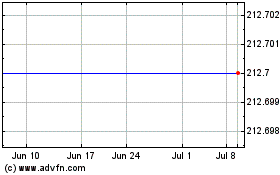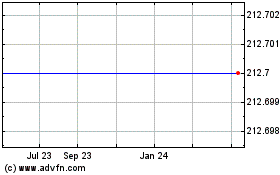UPDATE: Blue Shield Calif: Won't Raise '11 Individual Rates
March 16 2011 - 6:29PM
Dow Jones News
Nonprofit health insurer Blue Shield of California has withdrawn
its rate filing with the state's insurance department and said
Wednesday it won't increase rates to any individual or family-plan
member for the rest of the year.
The insurer, which has 340,000 individual- and family-plan
members in the state, had been criticized by California's insurance
commissioner early this year for planning "excessive" premium
increases on individual policies and, in response, submitted its
rates to an independent review.
"By agreeing to not raise rates this year, we are helping to
make coverage more affordable for our members during tough economic
times. It's a financial risk for us, but a risk that's worth
taking," Chairman and Chief Executive Bruce Bodaken said in a
statement.
The organization lost $27 million on individual coverage last
year and had expected additional losses in 2011 even with the
now-withdrawn increases, the insurer said, adding that individual
policy holders will save $35 million to $40 million this year as a
result of its decision.
Blue Shield had filed late last year for new individual rates,
which were to have been effective March 1. New Insurance
Commissioner Dave Jones in January asked Blue Shield and the three
largest for-profit U.S. health insurers--WellPoint Inc. (WLP),
UnitedHealth Group Inc. (UNH) and Aetna Inc. (AET)--to delay their
new rates in the state by at least 60 days. The insurers did so,
although Blue Shield didn't initially agree.
Jones had said some Blue Shield consumers would see a 59% rate
increase under the filing.
An independent actuarial review found the Blue Shield rates were
appropriate, the insurer said, but they won't take effect as a
result of the filing withdrawal.
The insurance department continues to review the filings of the
three for-profit insurers that delayed their rate increases.
"My hope is that all three of the other insurers will look at
what Blue Shield did and hopefully follow suit," Jones told Dow
Jones Newswires, noting he doesn't have authority to require them
to do so. Jones said he wasn't prepared to say whether the
insurers' proposed increases were reasonable. "I will say, though,
that they are certainly unsustainable for consumers and business in
the state of California."
WellPoint had no update to the status of its California Anthem
rates, which are postponed to comply with Jones' request for time
to review them, a spokeswoman said. They were originally set to go
into effect Jan. 1 and April 1.
A spokesman for UnitedHealth's PacifiCare said the insurer is
working with the department on its proposal, and is "confident that
once the commissioner's office has had an opportunity to review the
additional information, they will agree that the modest premium
increases we identified are reasonable in relation to the benefits
provided to our customers."
Aetna's new individual rates are expected to go into effect
around June 1 because of the delay, a spokesman said.
"I am pleased that Blue Shield announced this morning that it
has decided not to move forward with the third of its three rate
increases in less than a year," Jones said in a statement. "For
some Blue Shield policyholders, the total of these three rate
increases was as much as 87%," with the third averaging 6.5%, he
said.
Blue Shield's decision, he said, confirms the need to give the
insurance commissioner authority to reject excessive rate hikes,
which the office-holder currently cannot do.
Deutsche Bank (DB, DBK.XE) analyst Scott Fidel said California
has "one of the worst political and regulatory climates for
commercial health insurers in the U.S.," and noted that the 2010
elections installed a new activist insurance commissioner.
"Since his election, (Jones) has essentially opposed all rate
increases submitted by health insurers in the individual market,"
including Blue Shield's now withdrawn hike, even though the insurer
was losing money and an outside actuary deemed the rate hike
reasonable and not excessive, Fidel said.
The effect on publicly traded health insurers should be modest,
because they're already either losing money or generating very
modest returns in California's individual market, Fidel said. Blue
Shield will likely gain market share because it withdrew its rate
increase, though the new members probably will be those now
generating losses for competitors, he said.
-By Dinah Wisenberg Brin, Dow Jones Newswires, 215-982-5582;
dinah.brin@dowjones.com
Aetna (NYSE:AET)
Historical Stock Chart
From May 2024 to Jun 2024

Aetna (NYSE:AET)
Historical Stock Chart
From Jun 2023 to Jun 2024
